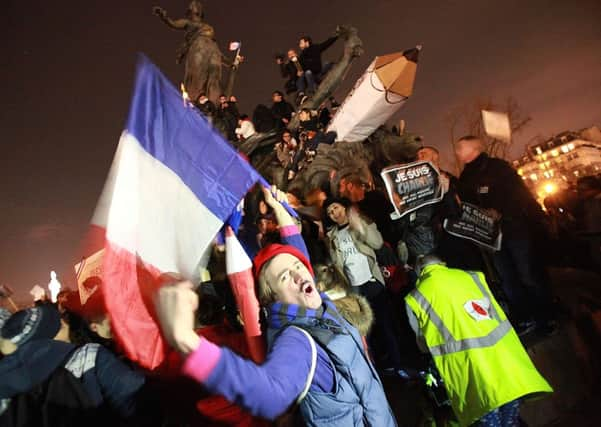UK to remodel terror exercises after Paris attacks


The meeting, which included heads of MI5, GCHQ and MI6, decided that the scenarios similar to scenes played out in the French capital last week – including the attack on the magazine Charlie Hebdo and hostage stand-off in a Jewish supermarket – should be included in exercises carried out by security forces in the UK.
CONNECT WITH THE SCOTSMAN
• Subscribe to our daily newsletter (requires registration) and get the latest news, sport and business headlines delivered to your inbox every morning
Advertisement
Hide AdAdvertisement
Hide AdThe UK’s terrorism alert remains at severe – the second highest level – amid continued concerns there will be an attack.
Mr Cameron has also pledged to beef up the security services’ powers to monitor online and telephone conversations between terror suspects despite concerns that it will be a “snooper’s charter.”
He said: “The first duty of any government is to keep our country and our people safe… I will make sure we do not allow terrorists safe space to communicate with each other.”
After the meeting between security chiefs and the Prime Minister, a Downing Street spokesperson said: “Following an intelligence update, they discussed the UK’s preparedness for similar incidents. The relevant police and agencies regularly carry out exercises to test their response to a terror attack, including scenarios similar to the incidents in Paris. The meeting agreed that for future exercises, the relevant agencies should identify whether there are any further specific elements of the Paris attack that should be built into the exercise scenarios.”
Meanwhile, Parliament’s joint committee on human rights has expressed concerns about the government’s counter-terrorism bill, which is due for its second reading in the House of Lords today.
It contains plans to block UK terror suspects returning to Britain and impose a statutory obligation on universities to prevent people being drawn into terrorism which the committee of MPs and peers said would violate the human rights of British nationals, even if it were only enforced on a temporary basis.
It also claimed that including universities in a list of institutions required to crack down on extremism had “implications for both freedom of expression and academic freedom”.
Immigration and security minister James Brokenshire said the government would “carefully consider” the report.
Advertisement
Hide AdAdvertisement
Hide AdThe bill has also been criticised by the Law Society in Scotland. Alan McCreadie, deputy director of law reform, said: “Providing the Home Secretary with the power to deprive a UK citizen of their right to live in the country of which they are a citizen is an unprecedented power in UK legislation.
“It is important that consideration is given as to how the provisions of the bill ensure the rights conferred under ECHR [the European Convention on Human Rights] are upheld.”
SCOTSMAN TABLET AND IPHONE APPS